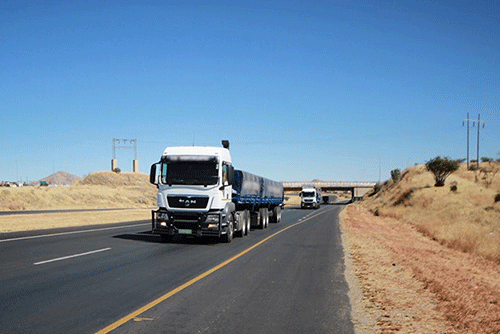In a debate in the national assembly last week on the trade benefits of the Walvis Bay, Ndola and Lumbubashi Development corridors, trade minister Lucia Iipumbu said these corridors would play a very significant role in boosting intra-African trade.
Iipumbu was reacting to transport minister John Mutorwa when he tabled the ratification of the agreement between DRC, Namibia and Zambia on the establishment of the Walvis Bay, Ndola, Lubumbashi Development Corridor in February 2021 to the National Assembly.
Iipumbu noted that boosting African trade would help regional governments make incremental progress towards the realisation of deeper regional and continental integration, which would indeed bring about significant spill-over benefits to Namibia.
“This seeks to reduce the costs and time it takes to deliver goods and services to regional markets as well as maximise the potential of transport and economic corridors as conduits of social and economic transformation for the southern African region and Namibia, in particular,” explained Iipumbu.
She continued that the corridor provides the shortest route between the maritime ports of Namibia and the vital transport and logistics hubs of Zambia, southern DRC and Zimbabwe. To further support the acceleration of corridor development, she stated that the trade ministry, with the support of the South African department of trade, mandated the Walvis Bay Corridor Group (WBCG) to identify ways of attracting investment along the Walvis Bay corridors through the Spatial Development Initiative (SDI) programme.
The SDI programme aims to increase the scale of economic activity and improve the diversity of economic activity along these corridors, thereby enhancing economic growth in the region.
Iipumbu revealed the initial focus in terms of economic activities is on key sectors such as mining, tourism, manufacturing, agriculture, fisheries and logistics.
“Regional support to ensure harmonisation of standards, allowing for the smooth flow of trade between borders, must be ensured through the establishment of partnerships such as this one and the involvement of both public and private-sector representatives,” said Iipumbu.
She added that Namibia cannot handle international trade single-handedly or in isolation.
Iipumbu further emphasised this cooperation will bring about a compelling value proposition and unlock economic value with multiplier effects to various other sectors and industries in Namibia.
According to Vipua Muharukua, Popular Democratic Movement (PDM) parliamentarian, Namibia must ensure it generates maximum benefit for the corridor.
He further urged the transport ministry to engage the public and hear their potential to harness better economic activities through the corridor.
Contributing to the debate, Minister of Fisheries and Marine Resources Albert Kawana said Namibia needs to expand logistics and create facilities for truck repairs, as this will contribute to boosting economic activities through the establishment of the corridor.
Furthermore, agriculture minister Calle Schlettwein noted that such corridor developments with neighbouring states make countries more competitive in delivering better services.
He also outlined that Namibia should not just focus on facilitating trade but also encourage manufacturing and value addition along the corridor.


